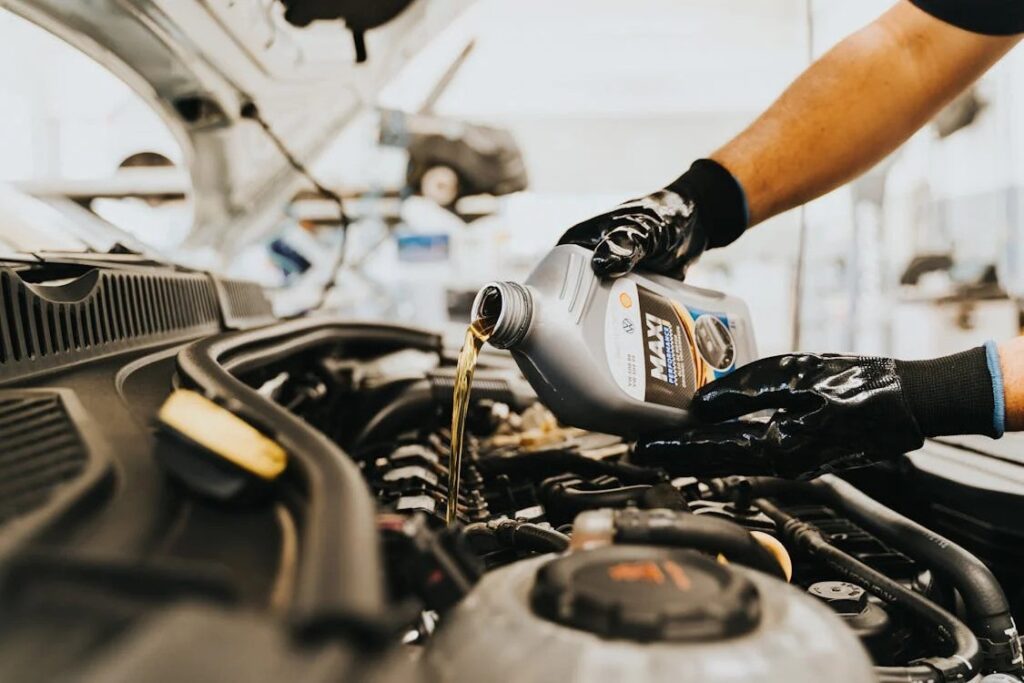How Often Should You Change Synthetic Oil?
If you drive a car that requires synthetic oil, you might be curious about the ideal oil change frequency. How often should you change synthetic oil? It’s a question that leaves car owners scratching their heads. But the truth is, there is no right or wrong answer as the oil change frequency depends on many variable factors.
This guide aims to shed light on the frequency of your car oil change and the importance of having one, as well as tips on how to choose the right oil for your vehicle.
Key Takeaways
• Regular oil change is part of a car’s preventive maintenance routine. It ensures the engine is in optimal condition to perform efficiently, and to avoid expensive repairs or engine replacement.
• Synthetic oil is developed with advanced lubrication technology, which makes it the best option for your car. It also lasts longer than conventional oil, which means less frequent oil changes.
• The frequency of oil changes is influenced by many factors, including the type of car, age, driving habits and conditions, and the oil quality. Manufacturer recommendation also impacts the frequency of oil change intervals.
• Failing to change your car oil can lead to various issues, such as engine noise, oil leaks, reduced fuel efficiency, overheated engine, increased emissions, and complete engine failure.
Why is Car Oil Change Important?

When it comes to maintaining your car, there are few things as important or as easy as an engine oil change. Thus, you must stick to your recommended oil change schedule.
But first, why is car oil change important?
To understand this, you must learn about the role of a motor oil to your engine. It lubricates the internal engine components to protect it from wear and tear. When your car is idle, the oil settles at the bottom of the engine pan. When you start the engine, it must surge up to the valve gear and then flow back down.
The engine consists of several moving parts, which can create friction as your vehicle runs. When there is excessive friction on these internal components, your engine system works harder to function. Over time, it creates excessive heat and pressure onto the engine. The oil prevents that from happening by coating each component to protect them as they move.
Regular oil change is part of a preventive car maintenance routine. The oil and oil pressure impacts the performance of the engine, so when there is inadequate oil level, these systems cannot function as they are designed.
The filters in your car engine can only hold so much debris before the rest of them seeps into the engine. Excessive debris buildup can lead to friction loss, which eventually results in a drop of fuel efficiency and engine performance.
Frequent oil changes might be costly, but it is a crucial step in ensuring that your vehicle engine is in optimal condition and that you won’t run into troubles later on. These engine issues can end up costing you more in the long run.
What is Synthetic Oil?

Today’s automotive market has evolved largely to offer various engine and motor oil options to suit every kind of vehicle engine system. When talking about engine oils, they typically fall into three categories:
• Synthetic oil
• Semi-synthetic oil
• Conventional oil
Synthetic oil is the most common type of engine oil, which is also known as full-synthetic oil. It is derived from a high-quality crude oil as base. This engine oil undergoes numerous refining methods and chemically enhanced friction modifiers to deliver exceptional engine protection, which you cannot find with conventional or semi-synthetic oil.
Car mechanics and experts recommend this oil for most vehicles because of its low viscosity. A low viscosity engine oil allows the engine to spin faster and prevent overheating. In addition, it eliminates deposits that most conventional oils leave behind. These factors contribute to increasing the engine’s efficiency, which eventually leads to higher gas mileage.
Despite these benefits, you can only use synthetic oil on vehicles that specifically states they require synthetic oils. Keeping up with your oil change schedule helps maintain the engine and avoid any significant issues or major repairs.
How Often Should You Change Synthetic Oil?
Depending on the type of car you have, the general recommendation is to have your oil change once every 5,000 to 7,000 miles. In the past, car oil changes are required every 3,000 miles but the advancements in modern lubricants allow for longer intervals between oil changes. Several factors can also determine the actual frequency of your oil change, such as the type of car, type of transmission, location, and driving habits.
The best way to determine the frequency of your synthetic oil change is to check the car owner’s manual for the manufacturer recommendation. Each vehicle and engine system varies, so they also vary in the oil change frequency requirement.
Older cars might require more frequent oil changes, especially if you’ve had your vehicle for more than ten years. The failing engine components are at risk of malfunctioning, so they require more thorough care and maintenance, thus the rigorous oil maintenance schedule. However, newer cars are equipped with an oil-life monitoring system that tells you exactly when your car needs an oil change. The system will alert you when you need to take your car to a technician for its scheduled oil change.
Regardless of how frequent you have your car’s oil changed, it is ideal to check the oil level monthly. You can then top it up as needed. If you rarely use your vehicle, then most vehicle manufacturers recommend an annual oil change schedule, even if your system does not alert you yet.
Factors Influencing the Frequency of Oil Change
There is a general recommendation on the frequency of oil change, but various factors affect when a car will need an oil change. These factors can cause the oil change to happen more frequently or between longer intervals. Here are the factors that influence how often you should change your oil.
1. Oil Type
The type of engine oil is pivotal in determining the frequency of oil change. Synthetic oil boasts advanced properties, such as resistance to breakdown and advanced thermal stability. It means you can enjoy longer-lasting oil with better lubricating capabilities even under extreme conditions.
2. Vehicle Age and Mileage
Your vehicle is the first thing to consider when determining when it’s due for an oil change. Older vehicles are more prone to wear and tear, so they will require more frequent oil changes. On the other hand, newer cars with modern engines can withstand harsh driving conditions and have technology that indicates when your engine needs an oil change.
3. Preventive Maintenance
The maintenance you invest on your car will reap its benefits in the form of less frequent trips to your mechanic for an oil change. Commitment to regular preventive maintenance schedules ensure your engine and internal components are functioning efficiently.

4. Driving Conditions
Your location can impact the frequency of oil change as the climate can impact the engine health and performance. On the other hand, driving on a highway offers a more stable environment for the engine as you can drive on sustained speeds and brake or stop less frequently. Hence, highway cruising is better for the engine than urban commuters that deal with stop-and-go traffic on a regular basis.
5. Manufacturer Recommendations
When all else fails, refer to your owner’s manual on the recommended frequency of oil change based on mileage. The manual consists the basic information you need to know about your vehicle so follow the manufacturer’s recommendation as it is determined by the engine design and technology.
Signs That It’s Time to Change Your Synthetic Oil
If you’re driving a new car equipped with technology that alerts you it’s time to change your oil, you can skip this one. Otherwise, it is crucial to know the signs that you need to change your synthetic oil to avoid major repairs in the future.
• Dark, dirty oil – A clean oil is amber in color and slightly translucent. It is time for an oil change is dark and dirty as it has become filled with particles from the engine.
• Exhaust smoke – If dark smoke comes out of your car’s tailpipe, you need to change your oil or get an engine check-up.
• Excess mileage – If your car has exceeded the recommended minimum mileage for an oil change, you need to change your oil.
• Engine noise – Engine oil lubricates the internal engine components. When there is insufficient oil, it creates engine noises due to the friction in your engine components.
• Oily smell – If your vehicle interior starts smelling oil, you need to have your car serviced immediately. This smell could indicate an oil leak.
• Check engine or change oil light – The simplest indicator that you need an oil change is if your system alerts you to do so. This sign only applies to newer cars with oil monitoring system that will indicate if your oil needs changing.
A regular maintenance schedule is vital in keeping your engine in the best condition and run efficiently. A powertrain warranty is your car’s best protection against serious damage as it covers the repair of engine, transmission, and driveline components. It gives you peace of mind knowing your vehicle is covered.
What Happens If You Don’t Change Synthetic Oil?

We’ve already discussed the importance of changing your engine oil regularly. But what happens when you don’t change your oil?
It happens. Life gets in the way, and you’ve neglected your car that’s overdue for an oil change.
Here are the potential consequences if you don’t change synthetic oil:
• Poor Engine Performance
• Reduced Fuel Efficiency
• Engine Noise
• Oil Leaks
• Increased Emissions
• Overheated Engine
• Dirty Engine
• Increased Maintenance Costs
• Complete Engine Failure
Wrapping Up
There you have it, a complete guide on how often you should change your synthetic oil! While each vehicle is different, you can use this guideline to understand what factors can impact the frequency of your visit to the mechanic. And remember, more frequent oil changes are always better than overdue ones!
FAQs
Can Fully Synthetic Oil Last Two Years?
Synthetic oils are rated to last for up to 15,000 miles, which is between six months to a year. This estimation applies to normal driving conditions, so expect that estimate to go lower if you drive under extreme conditions.
How Do I Know If I Need Full Synthetic Oil?
Refer to the car owner’s manual. It will describe the exact type of oil you need based on the manufacturer’s recommendation.
Is It Okay to Change Oil Once a Year?
Car experts recommended changing your car oil at least once a year, even if you don’t drive it very often.




